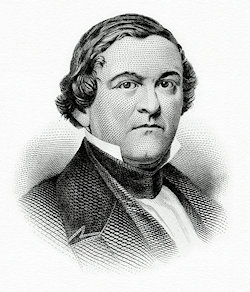Macon, Ga., 26 March, 1861.
My Dear Mr. Buchanan, I intended to address you this letter on the 5th of March, but at that time I was so much engaged at Montgomery that I could not carry out my purpose. In fact I have been constantly employed since my return to Georgia and have not even yet reached my home at Athens.
My heart often prompted me to write to you; but whilst you remained in Washington I declined to do so because I knew that my opinions differed so widely from yours that any suggestions from me would be obtrusive and unacceptable. Though silent I sympathised with you in every embarrassment which you encountered and rejoiced with all my heart when the fourth of March came and relieved you from troubles and difficulties which your counsels would have avoided but which were forced upon you by the folly and madness of your enemies and the enemies of your country. However much we may have differed and widely apart the roads we have travelled for the last few months, I assure you that the strong feeling of personal regard and attachment which your uniform kindness and confidence had created remains unchanged. I know not what the future has in store for any of us but I pray God you may long live to enjoy the peace and quiet of the home to which your old neighbors and friends have welcomed you with so much kindness and cordiality.
As you know, I never doubted the result of Lincoln’s election. My opinion was and is that it would and ought to dissolve the Union.
Upon this subject no shadow of a doubt has ever passed across my mind. Whilst with the good and true men of the north we could have happily and prosperously lived as brethren, there is between us and the northern abolitionists an intense mutual hatred which was irreconcileable. Separation was a necessity which could not be avoided and reunion an impossibility which will never be realized. The Union is not only dissolved but will never be reformed. Of this you may rest assured. Whatever differences existed among our people before the dissolution there is now but one sentiment on the subject of reconstruction; and that is, unalterable opposition to it. Good neighbourhood between the two sections is the universal desire of all our people, beyond that no one seeks to go. Our future relations depend much, if not entirely, upon the policy of Lincoln’s administration. If war is their policy we are prepared to meet it, however much we may regret the folly and madness which forces it upon us. But war with all its calamities will be welcomed with shouts of rejoicing in preference to submission to abolition rule or renewed brotherhood with our worst enemies, for such we hold the black republicans of the north to be. So far our movements in establishing the Confederate States upon a firm and lasting basis have been eminently successful. I think you will agree with me in pronouncing our constitution a great improvement upon the constitution of the U. S. in all the amendments we have made. Our people are not only content but joyous and happy, and blessed beyond all calculation with prosperity in every department of business. Providence has smiled upon us, and with grateful hearts we go on our way rejoicing. This is not the picture which you had looked for as the result of disunion, and I confess, with all my sanguine feeling, it promises to surpass even my hopes and expectations.
From Annual Report of the American Historical Association for the Year 1911.
Howell Cobb was an American political figure. A southern Democrat, Cobb was a five-term member of the United States House of Representatives and Speaker of the House from 1849 to 1851. He also served as the 40th Governor of Georgia and as a Secretary of the Treasury under President James Buchanan. Cobb is, however, probably best known as one of the founders of the Confederacy, having served as the President of the Provisional Congress of the Confederate States.
James Buchanan Jr. (April 23, 1791 – June 1, 1868) served as the 15th president of the United States from 1857 to 1861, serving directly prior to the American Civil War. A member of the Democratic Party for much of his career, Buchanan served as Secretary of State and represented Pennsylvania in both houses of the U.S. Congress before becoming President.
